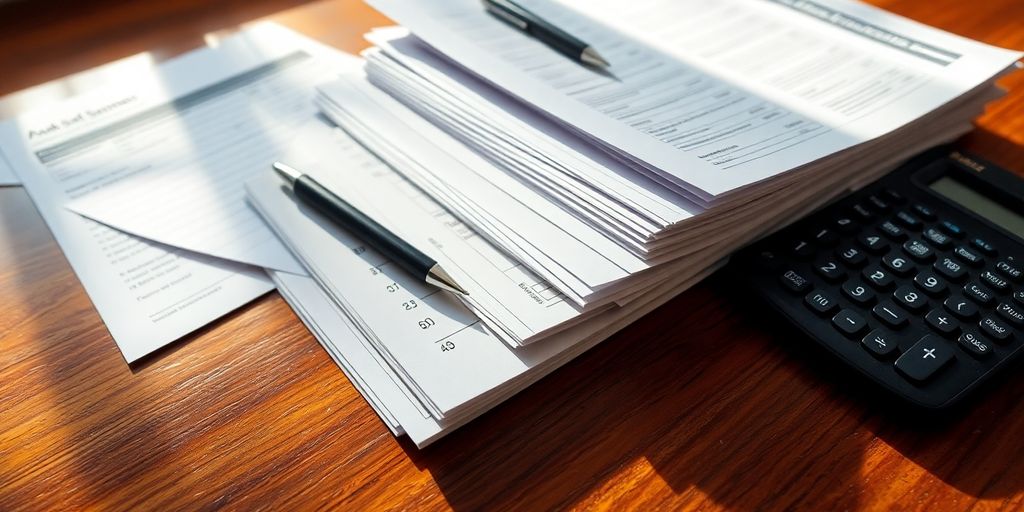The Essential Guide to Getting Pre Approved for a Home Loan
November 19, 2025
Learn how getting pre approved for a home loan can streamline your home search, boost credibility, and optimize your mortgage rate.

So, you're thinking about buying a house? That's a big step! One of the first things you'll hear about is getting pre approved for a home loan. It might sound a bit confusing, but trust me, it's super important. Think of it like getting your ducks in a row before you start house hunting. It helps you know what you can actually afford and shows sellers you're serious. In this guide, we'll break down everything you need to know about getting pre approved for a home loan, making the whole process a lot less scary.
Key Takeaways
- Getting pre approved for a home loan means a lender has looked at your finances and said, "Yep, we'd likely lend you this much money."
- This is different from prequalification, which is just a quick estimate, not a real check.
- Having a preapproval letter makes you look good to sellers and helps you pick houses in your price range.
- You'll need to share a bunch of financial papers, like pay stubs and bank statements, to get pre approved for a home loan.
- After you get pre approved, you need to keep your money situation stable until you close on a house, or things could change.
Understanding Mortgage Preapproval
What Mortgage Preapproval Means
Okay, so what is mortgage preapproval, really? It's basically a lender saying, "Hey, based on what we see right now, we're likely to lend you this much money." Think of it as a sneak peek at your potential borrowing power. It involves the lender taking an initial look at your finances to determine if they're willing to give you a loan. It's not a done deal, but it's a strong indicator. You'll get an idea of the mortgage types you might qualify for, the amount you could borrow, and potential interest rates. It's a super important step in the home-buying journey.
Key Differences: Preapproval Versus Prequalification
People often mix up prequalification and preapproval, but they're not the same thing. Prequalification is more like a quick estimate. You provide some basic info, like your income and debts, and the lender gives you a rough idea of what you might be able to borrow. It's a starting point, but it's not very solid. Preapproval, on the other hand, is much more in-depth. You'll have to provide documentation, and the lender will actually check your credit and verify your financial information. Because of this, mortgage preapproval carries a lot more weight. Here's a quick comparison:
Why Getting Preapproved for a Home Loan Matters
Getting preapproved is a big deal when you're trying to buy a house. For one, it shows sellers that you're a serious buyer. They know you've already been vetted by a lender, which makes your offer more attractive. It also helps you narrow down your home search. You'll know exactly how much you can afford, so you won't waste time looking at houses that are out of your price range. Plus, it can speed up the closing process once you find the right place. It's like having a head start in the home-buying race.
Getting preapproved also gives you time to address any issues that might pop up, like errors on your credit report. You can sort these things out before you're under pressure to close a deal. This can save you a lot of stress and potentially money in the long run.
Benefits of Getting Preapproved for a Home Loan
Getting preapproved for a home loan isn't just a formality; it's a strategic move that can significantly improve your home-buying experience. It shows sellers you're serious and prepared, and it gives you a clearer picture of what you can realistically afford. Let's explore some key advantages.
Gaining Credibility With Sellers
In a competitive market, standing out is essential. A preapproval letter signals to sellers that you're a serious buyer whose finances have already been vetted. This can be the edge you need to have your offer accepted, especially when competing with other offers. Sellers are more likely to choose a buyer who has already taken the steps to secure financing, reducing the risk of the deal falling through. Think of it as showing up to a job interview with glowing references already in hand. It just makes you look that much better. Mortgage pre-approval can significantly improve your chances of a seller accepting your home offer, as it demonstrates your financial readiness and commitment.
Streamlining Your Home Search
Ever spent hours browsing homes online, only to realize they're way out of your budget? Preapproval helps you avoid this disappointment. By knowing exactly how much a lender is willing to lend you, you can focus your search on properties that fit within your financial comfort zone. This saves you time and emotional energy, allowing you to make a more informed decision. It's like having a personal shopper who only shows you items that match your style and budget.
Optimizing Your Mortgage Rate Shopping
Preapproval isn't just about knowing how much you can borrow; it's also a powerful tool for securing the best possible mortgage rate. Getting preapproved from multiple lenders allows you to compare offers and potentially negotiate a lower rate. Even a small difference in interest rates can save you thousands of dollars over the life of the loan. It's like comparison shopping for any other major purchase – the more quotes you get, the better your chances of finding a great deal.
Getting preapproved gives you a clear understanding of your borrowing power, strengthens your negotiating position, and streamlines the entire home-buying process. It's a step that can save you time, money, and a whole lot of stress.
Steps to Getting Preapproved for a Home Loan

Okay, so you're thinking about buying a house? Awesome! Getting preapproved for a mortgage is a smart move. It's not as scary as it sounds, trust me. Here's the lowdown on how to make it happen.
Choosing the Right Mortgage Lender
First things first, you gotta shop around. Don't just go with the first lender you see. Different lenders offer different rates and have different requirements. It's like buying anything else – you want to find the best deal. Check out local banks, credit unions, and online lenders. Read reviews, compare interest rates, and see what kind of fees they charge. It might seem like a pain, but it can save you a ton of money in the long run.
Gathering Essential Financial Documents
Time to play detective... with your own finances! Lenders are going to want to see all sorts of documents to make sure you're good for the loan. Get organized and gather everything before you start the application process. This will make things way smoother and faster. Here's a quick list of what you'll probably need:
- Pay stubs from the last few months
- W-2 forms for the past two years
- Bank statements (checking and savings)
- Investment account statements
- Tax returns (federal and state) for the past two years
Navigating the Application Process
Alright, you've picked a lender and you've got all your documents ready. Now it's time to actually fill out the application. Most lenders let you do this online, which is super convenient. Just be honest and accurate with your answers. If you're not sure about something, ask! It's better to get clarification than to make a mistake that could mess up your chances of getting approved.
The lender will review your application and documents, and they'll probably pull your credit report. They're looking to see if you're a responsible borrower who pays their bills on time. If everything looks good, they'll issue a preapproval letter. This letter tells you how much they're willing to lend you, which is a huge help when you're house hunting.
Documents Required for Home Loan Preapproval

Getting preapproved for a home loan means showing a lender you're a serious buyer. Part of that involves handing over some important paperwork. It might seem like a hassle, but being prepared can really speed things up. Let's break down what you'll likely need.
Proof of Income and Employment
Lenders want to know you have a steady income to repay the loan. This is why providing proof of income is so important. Expect to gather things like:
- Pay stubs: Usually covering the last 30 days.
- W-2s: From the past two years.
- Tax returns: Possibly for the last two years, especially if you're self-employed.
- 1099 forms: If you're a freelancer or independent contractor.
If you have other income sources, like alimony or child support, be ready to provide documentation for those too. For employment verification, lenders might contact your employer directly. Self-employed folks might need to provide additional documentation to verify income.
Asset Verification for Getting Preapproved
It's not just about income; lenders also want to see what you own. This shows them you have resources beyond your monthly paycheck. Here's what they typically ask for:
- Bank statements: Covering checking, savings, and money market accounts.
- Investment account statements: Showing stocks, bonds, and mutual funds.
- Retirement account statements: Like 401(k)s and IRAs.
Lenders want to confirm you have enough funds for the down payment, closing costs, and reserves. They might also ask about other assets, like real estate or vehicles. Be prepared to explain any large or unusual deposits in your accounts.
Debt and Credit History Documentation
Your debts and credit history are a big part of the preapproval process. Lenders will pull your credit report, but you should also be ready to provide information about your existing debts. This includes:
- Credit card statements: Showing balances and payment history.
- Loan statements: For auto loans, student loans, and personal loans.
- Mortgage statements: If you already own a home.
It's a good idea to check your credit report beforehand to ensure a high enough credit score and fix any errors. Also, be ready to explain any negative marks on your credit, like late payments or collections. Lenders want to see that you manage your debt responsibly.
What Happens After Getting Preapproved
So, you've got that preapproval letter in hand. Congrats! But what's next? It's not a golden ticket to homeownership just yet, but it's a really important step. Here's what you need to know:
Understanding Your Preapproval Letter
That letter isn't just a piece of paper. It outlines the loan amount you're likely to be approved for, the interest rate (though this can change!), and the timeframe the preapproval is valid for. Pay close attention to the expiration date. Usually, preapprovals are good for 60 to 90 days. Also, understand the preapproval is conditional. The lender still needs to verify all your information and appraise the property you want to buy.
Maintaining Financial Stability
This is super important. Don't go on a spending spree or make any big financial changes. Lenders will do another check of your credit and finances right before finalizing the loan. Here's a quick list of things to avoid:
- Taking out new loans (car, credit cards, etc.)
- Making large purchases on credit
- Changing jobs (if possible)
- Missing any bill payments
Basically, keep everything as stable as possible. Any major changes could jeopardize your loan approval. Think of it as keeping your financial house in order until you get the keys to your new one.
Moving Towards Final Loan Approval
Now comes the fun part – finding a house! Once you've found the one and your offer is accepted, you'll need to provide the lender with the purchase agreement. They'll then order an appraisal of the property to make sure it's worth the amount you're borrowing. The lender will also do a final check of your credit and finances. If everything checks out, you're on your way to final loan approval and closing!
Wrapping It Up
So, there you have it. Getting pre-approved for a home loan might seem like a big deal, but it's really just a smart move. It helps you figure out what you can actually afford, and it makes you look good to sellers. Plus, it can save you some headaches down the road. Just take it step by step, and you'll be in a good spot when you find that perfect house.
Frequently Asked Questions
What does 'preapproved' mean for a home loan?
Getting preapproved for a home loan means a lender has looked at your money situation and decided how much they might lend you to buy a house. This isn't the final loan, but it gives you a good idea of what you can afford.
What's the difference between preapproval and prequalification?
Preapproval is a stronger step. The lender checks your credit and finances more deeply. Prequalification is just a quick look at your income and debts, giving you a very rough estimate. Preapproval shows sellers you're serious.
Why is getting preapproved so important?
It's super important! It tells you how much house you can truly afford, helps you look for homes in your price range, and makes your offer look stronger to sellers. It also speeds up the whole buying process later on.
What documents do I need for preapproval?
You'll need things like recent pay stubs, tax forms from the last couple of years, bank statements, and information about any debts you have, like car loans or student loans.
How long does it take to get preapproved?
The time it takes can be different, but often it's pretty quick, sometimes just a few days if you have all your papers ready. It depends on how fast you give the lender what they need and how busy they are.
Does a preapproval letter expire?
Yes, it can. The preapproval letter usually has an expiration date, often 60 to 90 days. If it runs out, you might need to update your information with the lender to get a new one.

Alex Chen

Alex Chen













Get in touch with a loan officer
Our dedicated loan officers are here to guide you through every step of the home buying process, ensuring you find the perfect mortgage solution tailored to your needs.
Options
Exercising Options
Selling
Quarterly estimates
Loans
New home

Stay always updated on insightful articles and guides.
Every Monday, you'll get an article or a guide that will help you be more present, focused and productive in your work and personal life.









.png)
.png)
.png)
.avif)
.avif)
.avif)
.png)
.png)
.png)
.avif)
.png)
.png)
.avif)
.png)
.avif)
.png)
.avif)
.avif)